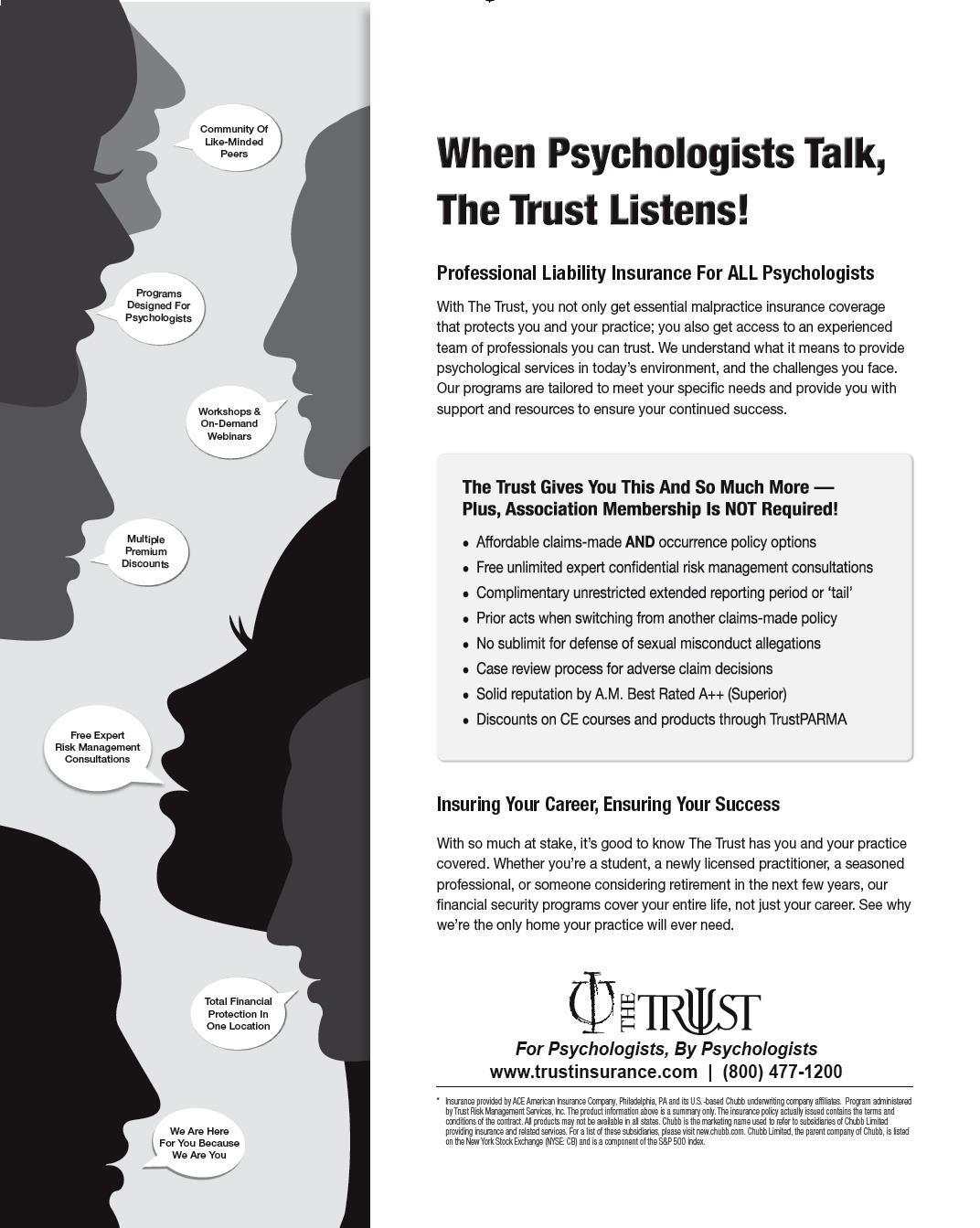
2019 ANNUAL REPORT & FALL CONFERENCE BROCHURE NJPA Masthead Here 2020DuesRenewalComingOctober1st! LookfortheEarlyBirdOffer!
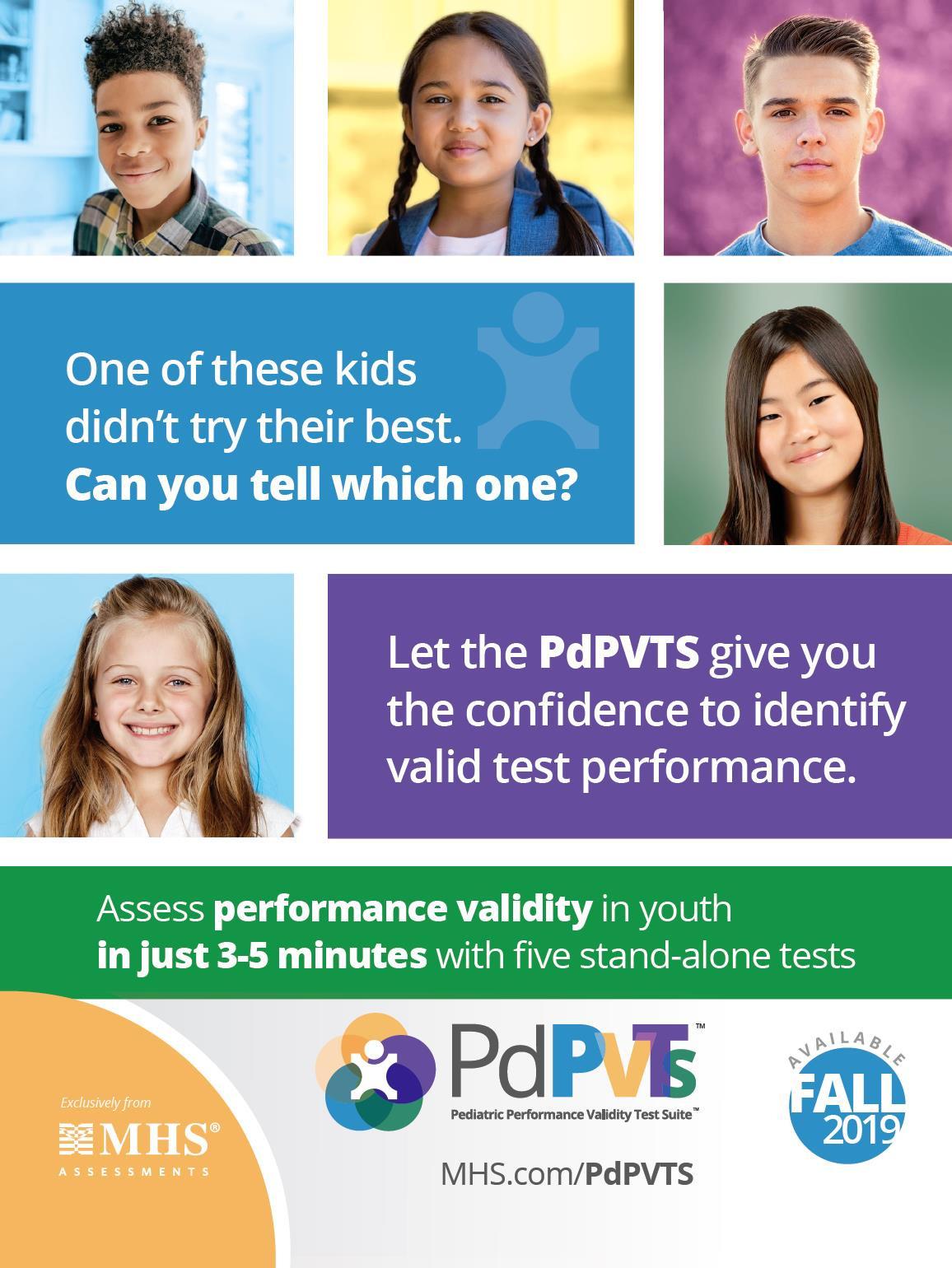
Renew your dues by 10/31/19 and receive a $20 coupon code to use towards a 2020 NJPA CE Program!
Plus: Your Choice of one of the following options! Option 1: $20 off 2020 Sustaining Membership or Option 2: $20 off 2020 Referral Network!
NJPA Executive Board
President: Morgan Murray, PhD
President-Elect: Lucy Sant'Anna Takagi, PsyD
Past-President: Stephanie Coyne, PhD
Secretary: Mary Blakeslee, PhD
Treasurer: Daniel DaSilva, PhD
Parliamentarian: Joseph Coyne, PhD
Members-at-Large:
Phyllis Bolling, PhD, Elio Arrechea, PhD, Daniel Lee, PsyD, Nicole Rafanello, PhD, Randy Bressler, PsyD, Alan Lee, PsyD
APA Council Representative: Rhonda Allen, PhD
NJPAGS Chair: Christopher Thompson, MA, EdS
ECP Chair: Michelle Pievsky, PhD
Affiliate Caucus Chair: Rosalie DiSimone-Weiss, PhD
CODI Co- Chairs: Phyllis Bolling, PhD & Aida Ismael-Lennon, PsyD
Director of Academic Affairs: Francine Conway, PhD
Affiliate Representatives: Nansie Ross, PsyD (Northeast Counties Association of Psychologists)
Susan Esquilin, PhD (Essex/Union County Association of Psychologists)
David Krauss, PhD (Mercer County Psychological Association)
Tammy Dorff, PsyD (Middlesex County Association of Psychologists)
Tamara Latawiec, PsyD (Monmouth/Ocean County Psychological Association)
Randy Bressler, PsyD (Morris County Psychological Association)
Janie Feldman, PsyD (Somerset/Hunterdon/Warren Psychological Association)
Daniel Lee, PsyD (South Jersey Psychological Association)
Executive Director: Keira Boertzel-Smith
Director of Professional Affairs: Judith Glassgold, PsyD
Central Office
Executive Director: Keira Boertzel-Smith
Director of Professional Affairs: Judith Glassgold, PsyD
Senior Communications Manager: Christine Gurriere
Continuing Education & Event Coordinator: Ana DeMeo
Member Services Coordinator: Jennifer Cooper
Preparation of Manuscripts
All manuscripts submitted for publication should follow APA style Manuscripts should be edited, proofread, and ready for publication Please prepare your manuscript in a word-processing program compatible with MS Word using Times New Roman font in 12 point type, left flush Please submit your manuscript via e-mail to Gianni Pirelli at gianni pirelli@gmail com
Editorial Policy
Articles accepted for publication will be copyrighted by the publisher and the publisher will have the exclusive right to publish, license, and allow others to license, the article in all languages and in all media; however, authors of articles will have the right, upon written consent of the publisher, to freely use of their material in books or collections of readings authored by themselves It is understood that authors will not receive remuneration for any articles submitted to or accepted by the New Jersey Psychologist Any opinions that appear in material contributed by others are not necessarily those of the editor, advisors, or publisher, nor of the particular organization with which an author is affiliated
Manuscripts should be sent to:
Editor: Gianni Pirelli, PhD
E-Mail: gianni pirelli@gmail com or NJPA Central Office E-Mail: NJPA@PsychologyNJ org
Published by: New Jersey Psychological Association 354 Eisenhower Parkway, Plaza 1, Suite 1150 Livingston, NJ 07039 973-243-9800 • FAX: 973-243-9818
Web: www PsychologyNJ org New Jersey Psychologist (USPS 7700, ISSN# 2326098X) is published quarterly by New Jersey Psychological Association, 354 Eisenhower Parkway, Plaza 1, Suite 1150, Livingston NJ 07039 Members receive New Jersey Psychologist as a membership benefit Periodicals postage pending at West Orange, NJ and additional mailing offices
POSTMASTER: Send address changes to New Jersey Psychologist, 354 Eisenhower Parkway, Plaza 1, Suite 1150, Livingston, NJ 07039
Table of Contents W A T C H F O R O U R E A R L Y B I R D 2 0 / 2 0 D U E S R E N E W A L O F F E R ! CHECK YOUR EMAIL INBOX ON OCTOBER 1ST! 2 From the President 3 Who We Are & Where We're Headed 5 We're on the Move! 5 2019 Trenton Day 6. Advocacy 7. Early Career Psychologists: The Cost of Becoming a Psychologist 8 Your Association at a Glance 9 The Heart of NJPA: The Foundation 10 Your Communities - Get Involved! 11. 2019 Fall Conference: The Anxiety Epidemic 15. Upcoming CE Programs Page
From the President
Expanding the Definition of Guild by
President, Morgan Murray, PhD

For some time, there has been discussion and debate around NJPA having a guild focus versus a social advocacy focus The tension in this polarity is evident at the annual APA Practice Leadership Conference where professional advocacy is a key component of the whole experience. As conference participants, we receive specific training on how to advocate for the profession of psychology with our members of Congress This training culminates with a day on Capitol Hill In 2019, for instance, we sat down with legislative aides for several of our elected representatives and advocated for the inclusion of psychologists within the Medicare definition of physician so that psychologists could bill for services in hospital settings, as they already do in private practice settings This is a traditional guild issue of critical importance, but there was something new this year. In addition to this more traditional advocacy, we were encouraged to let our trainers know if we wanted to advocate for a social justice issue, as well It was a turn by APA in the direction of social advocacy
The concept “social advocacy” may have many different meanings to our diverse membership. With this in mind, NJPA developed a social advocacy policy in 2017 that set forth criteria for the NJPA executive board to use when deciding when and how to assert a social advocacy position The criteria requires that any statement must be supported by psychological science, and must involve an area where psychologists have expertise Further, NJPA must consider whether it informs the public and policy-makers on the issue, and also consider if there are risks to NJPA or the public. With these criteria in mind, the policy allows the NJPA executive board to “ …make scientifically-informed public statements on social issues that affect the mental health and well-being of the diverse people of New Jersey ” The guideline of most relevance to the work of NJPA is the requirement that any social advocacy statement from the NJPA executive board must be consistent with the NJPA mission. In other words, it must promote the goals of the association. This guideline also applies to traditional professional advocacy.
Guild issues and social advocacy, considered this way, promote and protect the professional interests of psychologists and the welfare of the public who need psychological services. These two focuses are intertwined. It would be difficult to think about the ways NJPA supports professional psychology without remembering our work to establish the psychology licensing law, or the peer review law, and current efforts to revise the licensing law so students may earn all their supervision hours toward licensure pre-doctorly. Similarly, as the field is changing, people will remember NJPA’s and its members’ contributions of knowledge, training, and expertise regarding issues that directly impact public mental health concerns Our recently established Immigration Emergency Action Group (IEAG) is an example The IEAG collaborates with community organizations with a goal of providing education, training, psychological assessment, and pro bono psychological resources to immigrant children separated from families and detained in New Jersey. Efforts like this promote a positive expansion of the public’s view of NJPA and its guild. It tells the public who we are as psychologists, and demonstrates the relevance of our scholarship and accumulated knowledge Social advocacy, in the ever-changing world of professional psychology and healthcare, is central to our professional guild because it adds definition to who we are and what we offer the public. We clearly see this changing awareness of our guild with our psychology students and early career psychologists, who represent our future. In 2019, New Jersey Psychological Association Graduate Students (NJPAGS) elected one of its members to serve as the group’s Social Advocacy chair We also see it with NJPA’s Council on Continuing Education Affairs (CoCEA) that in accordance with APA now requires that CE programs include psychological research that addresses issues of diversity and inclusion. Another example is the formation of the InterMental Health and Psychological Association Coalition (IMPAC) that established a collaborative partnership, based on equality, between NJPA, the New Jersey Chapter of the Association of Black Psychologists (NJABPsi), and the Latinex Mental Health Association of NJ (LMHANJ) IMPAC’s first collaborative project was a presentation, Shine the Light on Multicultural Awareness in NJ, on April 12, 2019, that focused on the 2017 APA Multicultural Guidelines, and included a panel discussion about the psychology of historical racial trauma, resilience, intersectionality, and culture.
There are many more examples of this expanding definition of guild As August approached, an email arrived from APA with an invitation for a program at the 2019 APA Convention State Leadership Forum entitled: From Polarization to Action: Reconciling Guild and Social Justice Issues in SPTA’s We see this expanded awareness in the work of APA President, Dr Rosie Phillips Davis, who established APA’s Deep Poverty Working Group to look at how psychological science can be used to fight this problem. These examples, and many others, illustrate how expanding the definition of our guild is crucial for the evolution of our profession, and can create greater access to care for the diverse public we serve
From the President
2019 President Projects
Geographic Diversity Task Force: Purpose is to propose a two year “Access to NJPA” strategic plan
(See page 5)
Hospitality Task Force and President’s Video Project: Purpose is to make everyone at NJPA feel welcomed and to foster a sense of connection with NJPA. Also, to generate some interest among NJPA members to volunteer for leadership within the association We are working on introducing the NJPA executive board via video
Integrated Care Task Force: This task force will transition to a committee. Purpose is to focus on New Jersey integrated health care, often referred to as inter-professional health care, an approach characterized by a high degree of collaboration and communication among health professionals
Multimedia Task Force: Purpose is to create a proposal outlining how to generate content from our members and other sources, related to psychology and psychologists, for distribution by NJPA Central Office. The intended audience would be NJ lay people, media, legislators, NJPA members, and potential members The content could be related to public education, diversity, social advocacy, or professional advocacy in nature
RxP Task Force: Purpose is to create and distribute a short member survey that will poll our members about their opinions on prescription authority for psychologists and to determine if they will gain training, if it was passed into law in New Jersey The survey results will hopefully provide some diverse member feedback and can be used by the task force to write its recommendation to the NJPA executive board on whether RxP should become a legislative priority, again, for NJPA.
Past-Presidents: Current focus on the best way to incorporate and utilize the knowledge, expertise, and experience of our past-presidents including preserving the history of NJPA
Starting the Year Off Right Association Orientation
In January, we held our NJPA Association Orientation that is designed to provide the NJPA executive board, committee chairs, and affiliate presidents with association information necessary to become engaged in the work of the association right away, and to empower each individual to serve as an association representative and advocate for NJPA’s mission for a long time to come The more connected we all are at the beginning of the year, the better the year. We spent this orientation covering the NJPA Strategic Plan and discussed our core values that are reflected there
NJPA Strategic Plan
A strategic plan is a tool used to communicate, with members, the association’s goals, the actions needed to achieve those goals, and all other critical elements developed during the planning exercise Below are the current strategic plan goals:
Goal 1: Provide a professional community for all members of the New Jersey Psychological Association
A Advocate for the professional interests of members - Legislative Advocacy
B. Regulatory Advocacy
C Membership Recruitment and Retention
D. Provide professional development opportunities for members
E Assess members' needs and evaluate efforts to address these on an ongoing basis
F Support and strengthen the interrelationships among all organizational components of NJPA
G. Publicize the value and work of NJPA and of its members within the association and with the general public
H Develop and improve opportunities for member-to-member professional communication
Goal 2: Infuse and address diversity and inclusion issues into all areas of the association.
Goal 3: Address issues related to social advocacy involving the application of psychological science and psychological services related to the mental health of the diverse populations of New Jersey
NJPA Goes to Washington Federal Advocacy
On March 9, 2019, NJPA delegates attended the 36th APA Annual Practice Leadership Conference (PLC). This year's PLC theme “Advocacy and Leadership,” allowed our NJPA delegates to consider and learn what we need to do and become to advance and affirm psychology’s influence on a broad, dynamic scale The goal ensures that psychologists are champions, innovators, and decision-makers who shape billing and reimbursement codes, licensing regulations, health care policies, and new practice technologies And increasingly, it means thinking expansively about novel ways psychology can be applied to solve complex problems The 2019 NJPA delegates were NJPA President, Dr Morgan Murray, NJPA President-Elect, Dr. Lucy Takagi, NJPA Director of Professional Affairs, Dr. Judith Glassgold, NJPA Early Career Psychologist Delegate, Dr Michelle Pievsky, NJPA Diversity Delegate, Alex Gil, MA, and NJPA Executive Director, Keira Boertzel-Smith.
Who We Are and Where We're Headed
The purpose of this report is to provide NJPA members with a 2019 mid-year snapshot of the association It highlights association work accomplished to date and provides important Fall Conference details. This association is made up of talented and bright individuals who are devoted to the promotion, protection, and enhancement of the profession and the public we serve We are very thankful for the dedication all the board members, committee chairs, committee members, past-leaders, general members, and NJPA staff whose hard work contributes to the vitality of our association There is always more to do and we will continue to work hard this year to accomplish the association’s business
We hope you enjoy this publication We hope to see you at one, or all, of our continuing education programs, including the 2019 Fall Conference Thank you for your association membership!
Morgan Murray, PhD Keira Boertzel-Smith NJPA President Executive Director
Our Mission Our Strategic Plan Goals Our Member Stats
The advancement of psychology as a science, as a profession, and as a means of promoting health and human welfare in an atmosphere that supports the diversity of its members and the society at large
Provide a professional community for all members of NJPA Infuse and address diversity and inclusion issues into all areas of the association
Address issues related to social advocacy involving the application of psychological science and psychological services related to the mental health of the diverse populations of New Jersey
Our CoreValues Development
At the 2019 Association Orientation and Board Retreat, attendees reviewed the above three NJPA strategic plan goals and came up with preliminary NJPA core values:
Strength through our association or membership community’s collective contributions
The expertise and training of psychologists to promote mental health
An attitude of cultural humility in promoting diversity and inclusion in all our association practices and activities
A welcoming and respectful atmosphere in all of our association’s communication efforts and activities
Efforts to secure the benefit of human welfare for the residents of NJ in all its diversity
What core values ideas come to your mind when you review the three NJPA strategic plan goals? We will be formally asking for member input in the fall.
(1610 total members YTD)
0 250 500 750 1000 1250 Non Resident Associate Post Docs Non Lic Lic < 2 yrs Emeritus Senior Students Lic 2-5 yrs Lic 5+ yrs
We're On The Move!
The New NJPA Central Office Location: 354 Eisenhower Parkway, Plaza 1, Suite 1150 Li i NJ 07039
Take Advantage of NJPA Remote Professional Consultations
NJPA is here for our members to help you through any professional difficulties you may experience. These consultations are remote, for your convenience. Our Director of Professional Affairs (DPA) is available to assist you with practice and regulatory issues. Consultations are available on Tuesdays 10:00 am - 4:00 pm Call 973-243-9800 for a DPA consultation The NJPA Ethics Education and Resource Committee offers you free, confidential feedback concerning ethical questions that may arise in the course of your practice Ethics Committee consultations are available on weekdays Call 973-243-9800 for an ethics consultation. NJPA consultations should not be used as a substitute for obtaining personal legal advice and consultation prior to making decisions regarding individual circumstances
Making NJPA Accessible For All NJPA Members
Leadership Road Show
Each year, the NJPA leadership team and NJPA and NJPA Foundation special representatives travel around the state to local affiliates, legislators' offices, and New Jersey institutions and universities to discuss NJPA and its mission Sample road show discussion topics include the NJPA mission and goals; benefits of membership; leadership development; communications; continuing education; networking; NJPA and affiliate collaboration; topics of interest for graduate students and early, mid, and late career psychologists; state legislative and social advocacy priorities and efforts; federal advocacy priorities and social advocacy priorities and efforts; and our relationship with the American Psychological Association
Our Travel Calendar:
January 24, 2019 Trinitas (Elizabeth)
March 27, 2019 Stakeholders Forum (East Brunswick)
April 14, 2019 MOCPA (Red Bank)
May 10, 2019 SJPA (Cherry Hill)
July 10, 2019 Rutgers UBHC (Newark)
July 23, 2019 Majority Leader, Assemblyman Louis Greenwald (Voorhees)
August 21, 2019 Assemblywoman Valerie Vainieri Huttle (Englewood)
September 11, 2019 MCPA (Florham Park)

September 22, 2019 EUCAP (Maplewood)
Geographical Diversity Task Force: NJPA established a Geographical Diversity Task Force, co-chaired by Drs Hulon Newsome and Stephanie Coyne, with the purpose of proposing a two-year “Access to NJPA" strategic plan to include: suggested offsite venues for meetings and/or CE programs; recommendations to improve sustained collaboration with NJPA affiliate associations; identification of various ways to increase access to NJPA by its current and prospective members; and to increase NJPA’s presence as a valued resource where psychologists live and work
Virtual Meetings: Allows members from across the state to become active participants in all areas of the association.
2019 Trenton Day: Details to Come
NJPA will hold a 2019 Trenton Day in the Statehouse Annex on West State Street in Trenton NJP-PAC will be funding the day with the purpose of providing our members an opportunity to delve in to the NJ legislative process, understand how a bill becomes a law, and learn the importance of grassroots advocacy. We will hear from legislators and staff about the process in which legislation is introduced and passed We’ll share ideas on ways that psychologists and psychologists-in-training can influence the formation of public policies, will plan to sit in for a few minutes at a public hearing, and learn some of the history of state government and its buildings All are encouraged to attend Stay tuned for details We will ask you to RSVP
We appreciate use of the upcoming dues bill to support the NJP-PAC for the advancement of the stature of the profession of psychology in New Jersey. Thank you in advance for your meaningful contributions!
The New Jersey Psychology – Political Action Committee (“NJP-PAC”) is a voluntary, non-profit political action committee comprised of a board of trustees, consisting of New Jersey Psychological Association (“NJPA”) members NJPPAC is a separate entity, and is not affiliated with any political party or other political committee
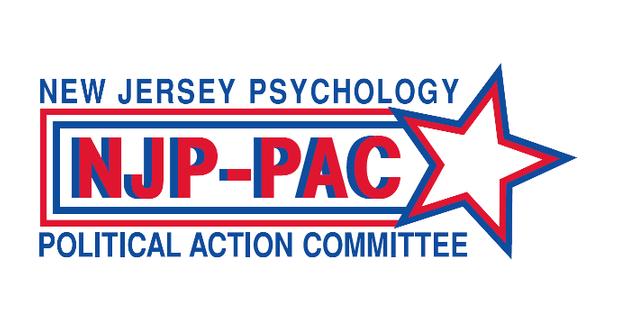
2019 New Jersey Psychology - Political Action Committee
(PAC) Officers
President: Frank Weiss, PhD
Treasurer: Mark Singer, EdD
Secretary: Kenneth Freundlich, PhD Executive Director, Keira Boertzel-Smith Government Affairs Agent: Jon Bombardieri
Advocacy
NJPA Members, Get Engaged in Ongoing New Jersey Legislation!
There are a lot of changes occurring in the NJPA Committee on Legislative Affairs (COLA), including ongoing efforts to keep membership informed and more involved in the process of legislative advocacy. Legislative information and updates can be found in NJPA Friday Updates, stand-alone email blasts, publications, and NJPA social media.
New in 2019! A dedicated Member Advocacy page was created to keep members fully informed of COLA activities Visit www psychologynj org and navigate to the Advocacy menu
Find the list of bills being reviewed by COLA
Review bills and submit comments to COLA or notify COLA of a bill of interest to the profession
Review the COLA Meeting Minutes (Including COLA positions on bills) and Operations Manual
Consider joining COLA! If interested, please contact NJPA Executive Director Keira Boertzel-Smith, at njpakbs@psychologynj org or at 973-243-9800.
Committee on Legislative Affairs Chair: Barry Katz, PhD
Past-Chair: Frank Weiss, PhD
Members: Jeffrey Axelbank, PsyD
Debra Davis, PhD
Sarah DeMarco, PsyD
Aida Ismael-Lennon, PsyD
Alan Lee, PsyD
Michelle Pievsky, PhD
Tamara Sofair-Fisch, PhD
Virginia Waters, PhD
Harold Zullow, PhD
Non-Voting Members:
NJPA President-Elect, Lucy
Sant'Anna Takagi, PsyD
Executive Director,
Keira Boertzel-Smith
Government Affairs Agent, Jon Bombardieri
NJPA is committed to strengthening our political outreach and advocating for the interests of NJ psychologists and mental health issues that are important to the public. Through our Committee on Legislative Affairs (COLA), Committee on Regulatory Affairs (CORA), and our Government Affairs Agent (GAA), NJPA is instrumental in maintaining standards of psychology practice in NJ, protecting patients’ rights, and supporting public policy.
2019 Legislative Highlight! NJ Licensing Act Legislation (A5307)
NJPA proposed amendments to the NJ Licensing Act to follow the APA Model Licensing Act. We believe that NJ must re-examine the licensing requirements for psychologists due to the substantial increase in the number of supervised hours most doctoral students must accumulate during their doctoral studies compared to what was required in such programs in the past. Psychology doctoral graduates are still required to complete half of the required hours after graduation even though most students have completed the total number of required hours (or even more) prior to graduation APA pointed out that this results in delayed licensing for qualified graduates, thereby negatively affecting access to mental healthcare.
There is a shortage of mental health services in New Jersey while the need has grown.
Many NJ residents in need of mental health treatment are not able to access the care they require
The National Alliance on Mental Illness (NAMI) gives NJ a "C" on health promotion and measurement
At-risk populations can’t find psychologists
More clinics would be able to hire early career psychologists if they could get reimbursed for their services, which necessitates that psychologists be licensed
On January 23, 2019 Assemblywoman Angelica Jimenez began the Assembly bill drafting work with the NJ Office of Legislative Services (OLS) NJPA is working on a Senate sponsor for the bill. We are focusing on including "may" language so that we are specifically clear that the required supervised practice may be completed, in whole or in part, during the predoctoral period.
June 6, 2019: Our legislation NJ Licensing Act Legislation (A5307) passed the Assembly Regulated Professions Committee by a vote 7-0! This revises psychologist training requirements for licensure NJPA President-Elect, Lucy Career Psychologist Chair, Michelle g. We thank primary sponsors ma
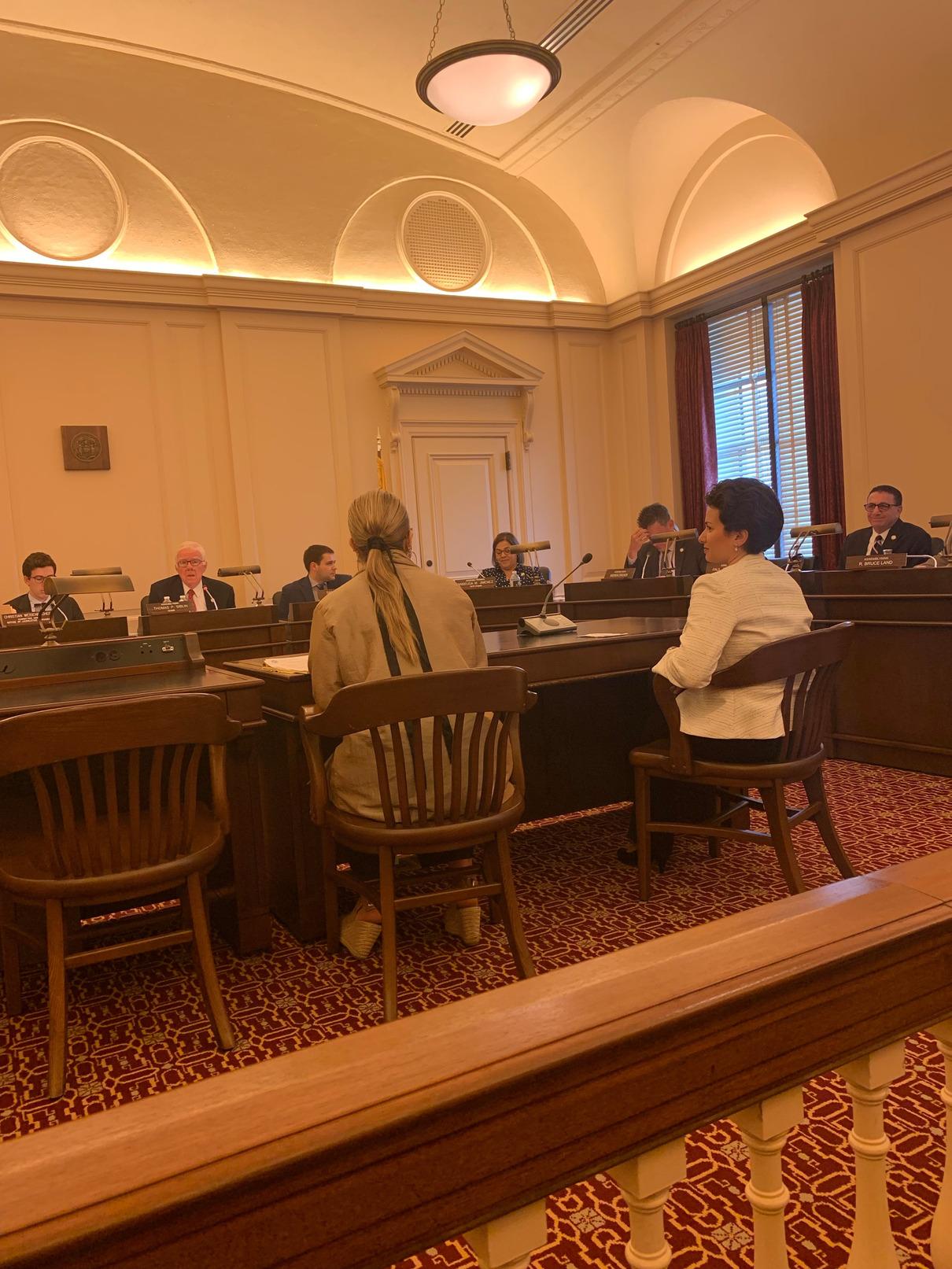
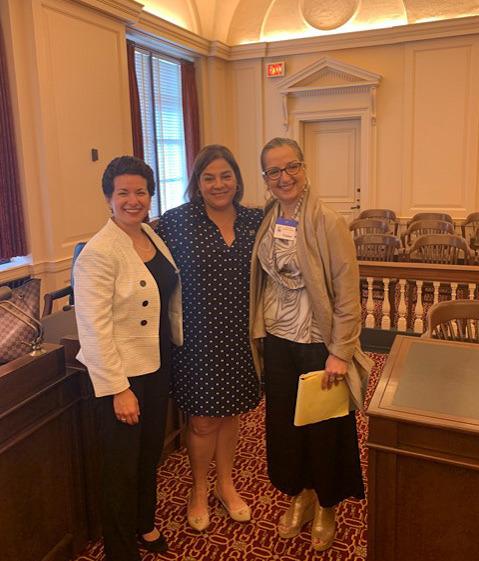
The costs of becoming a psychologist are rising, and the challenges permit holders and early career psychologists (ECPs) face are increasing. That's why NJPA created the ECP Committee to provide a community and resources for ECPs during this pivotal point in their careers when they have costs and challenges without institutional support
The purpose of the Early Career Psychologists Committee (ECP) is to: promote the needs of permit holders and early career psychologists, strengthen the representation of permit holders and early career psychologists in NJPA, support and expand resources for permit holders and early career psychologists within New Jersey, foster leadership for permit holders and early career psychologists within NJPA and the New Jersey community, and raise the consciousness of NJPA members and New Jersey psychologists about issues of diversity that specifically impact permit holders and early career psychologists.
Some of the ECP Committee Goals: Change the New Jersey legislation predoctoral hours requirements (See the previous page);
Investigate discrepancies in EPPP failure rates and support minority permit holders studying for and taking the exam;
Further develop a directory of postdoctoral positions;
Create career development resources; Host didactics and other presentations relevant to ECPs;
Provide mentoring and network opportunities;
Represent the ECP community within NJPA;
Create a pipeline from graduate student to early career psychology
The Cost of Becoming a Psychologist infographic was created by ECP Committee Co-Chairs Michelle Pievsky, PhD, and Stacie Shivers, PsyD If you are interested in joining the ECP Committee, please contact them at michelle.a.pievsky@gmail.com and staciedshivers@gmail com
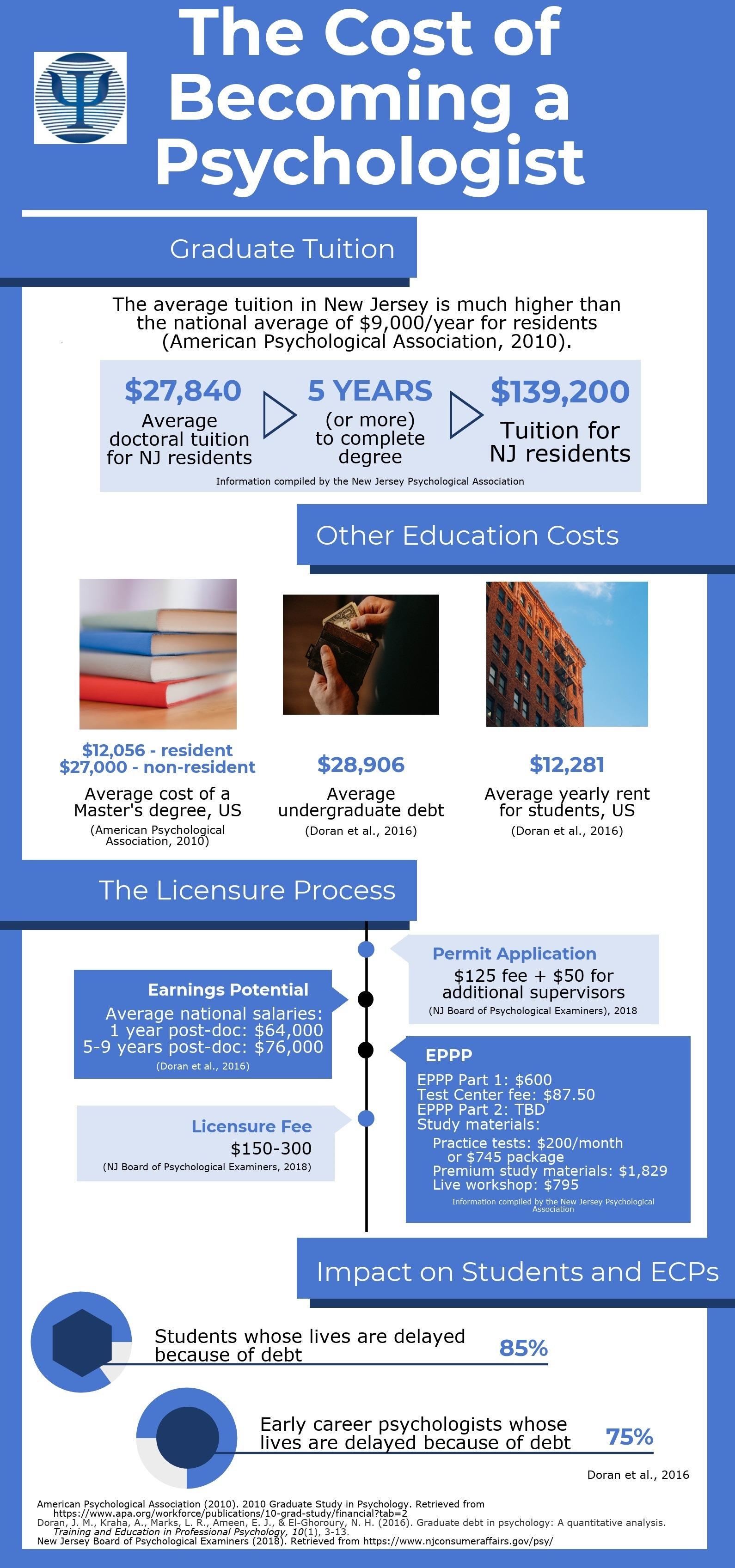
Your Association At a Glance
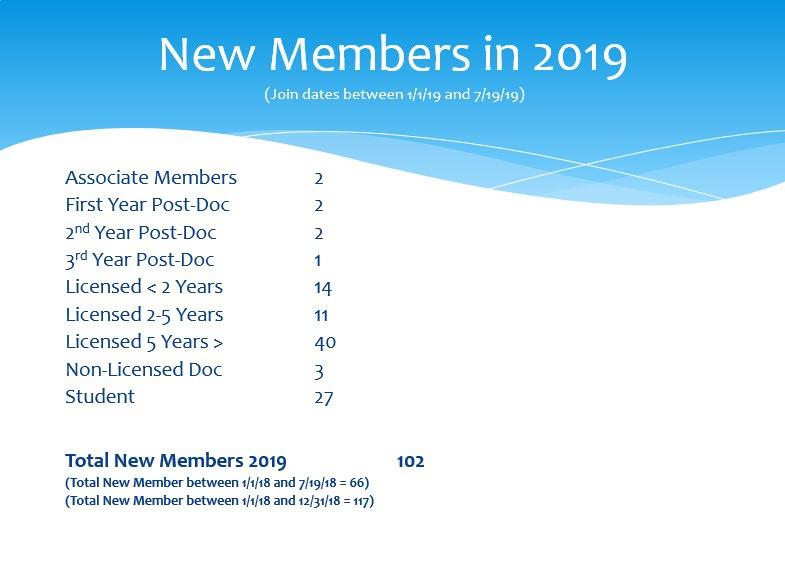



Member Numbers by County* 7 197 26 43 4 2 198 11 24 31 77 106 118 131 30 34 3 82 16 105 5 *information as reported in member profiles Member Listserv 959 Members 22,980 posts! join in the conversation! 318 1978 360 45 (new!) 18 (new!) Our Followers Friday Update 40% Open Rate www.psychologynj.org Visitors: 18,896 +27% Page Views: 98,327 +17% Website Visitor Breakdown By Age Group Most visited pages in 2019: Find a Psychologist Member Log In Upcoming Events Web Stats (YTD thru 6/30/19):
The Heart of NJPA: The Foundation
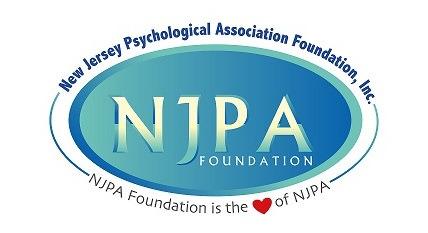
Your Generous Donations at Work!
Thanks to your generosity and support, the NJPA Foundation continues to provide grants that support the training of graduate students, who focus on the underserved residents in New Jersey. Without financial assistance, the Foundation would be unable to continue to fulfill its mission, “promoting the psychological health of the diverse people of New Jersey ” Here’s what your generous support enables us to do:
Our Mission
In addition to supporting the New Jersey Psychological Association (NJPA) mission, our mission is promoting the psychological health of the diverse people of New Jersey.
Board of Trustees
President: Mathias Hagovsky, PhD
Secretary: Toby Kaufman, PhD
Treasurer: Abby Rosen
Trustees:
Regina Budesa, PsyD
Richard Klein, EdD Ann Stainton, PhD
Belvin Williams, PhD
Eileen Kohutis, PhD
NJPA President-Elect:
Lucy Sant'Anna Takagi, PsyD
NJPA Executive Director:
Keira Boertzel-Smith
Staff Liaison: Jennifer Cooper
NEW! Dissertation Grants: Starting in 2019, the NJPA Foundation is offering NJPA Foundation Dissertation Grants to doctoral level graduate psychology students enrolled in a New Jersey doctoral level psychology program. The NJPA Foundation Board of Trustees may award up to $10,000 per grant recipient, per grant. The dissertation grant applicants will be reviewed on a rolling basis To be a candidate for this grant, a qualified graduate student must have one of the following two areas of study/exploration as the focus of her/his doctoral dissertation:
The Impact of School Violence on the Victims and on Society: The focus of this grant is the research, treatment, prevention, or other work of a heuristic value related to school violence including, but not limited to, the role of firearms Discussion of relevant policy change must be addressed in the dissertation, as well.
The Traumatic Impact of Separating Children from Families on the Victims and on Society: The focus of this grant must be research and/or treatment programs that addresses the treatment, rehabilitation, and/or prevention of trauma to victims of psychological child abuse caused by this practice. Discussion of relevant policy change must be addressed in the dissertation, as well.
Additional Grants & Awards
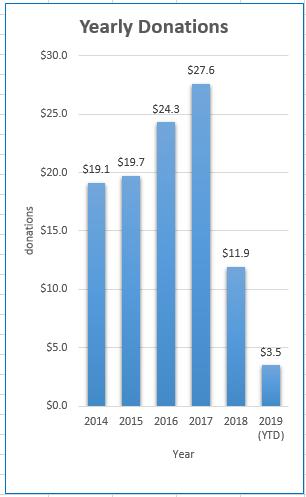
Student Conference Participation Grants: This grant promotes supplemental training and education experiences in professional practice and research, with an emphasis on treating underserved populations Attending conferences, workshops, seminars, and other scientific sessions are an essential part of the learning experience for psychology graduate students. Sessions provide an educational experience that allows students to observe and/or practice how didactic lessons can be applied to real-world treatment
Community Service Project Grants: The NJPA Foundation identifies exemplary programs that provide psychological services to those who cannot afford it and supports the training of doctoral students to work with these underserved populations
Graduate Student-Initiated Research Awards: funding for student-initiated research and projects addressing psychological issues that have significant impact on community health. Through the generosity of individual contributions, we are able to offer four awards and scholarships for innovative family, school, and community projects:
• The John M. Lagos Award for Research Into Causes and/or Treatment of Social Problems ($2,000): topics include school issues, work problems, health issues, and aggression
• The NJPA Foundation Scholarship for Research on Diversity Issues ($2,000): Awarded to a graduate student in psychology who (a) promotes a scientific understanding of the role of diversity in psychology; or (b) fosters the development of sensitive models for delivery of psychological services to diverse populations. Topics include issues related to cultural or ethnic issues, socioeconomic issues, gender issues, or work with underserved populations
• The Dr. Zellig Bach Award for the Study of the Family ($1,000): Awarded for the study of behavior related to divorce, teenage pregnancy, adoption, single parents with dependent children, interpersonal abuse, substance abuse, custody, dual careers, childcare, etc.
• The Winifred Starbuck Scott Award ($1,000): Awarded to a graduate student in school psychology for completing a distinguished project, usually during internship
Visit www.psychologynj.org/njpa-foundation to read more and make a donation to help us continue this important work! We strongly encourage use of the upcoming dues bill for donations to the NJPA Foundation!
Your Communities - Get Involved!
NJPA County Affiliate Organizations
NJPA currently has eight affiliate associations - Essex/Union County Association of Psychologists, Mercer County Psychological Association, Middlesex County Association of Psychologists, Monmouth/Ocean County Psychological Association, Morris County Psychological Association, Northeast Counties Association of Psychologists, Somerset/Hunterdon/Warren Psychological Association, and South Jersey Psychological Association. Affiliate organizations offer the opportunity to meet, network, and socialize with local colleagues. They hold meetings and offer speakers and programs (many include continuing education credits). The NJPA Affiliate Caucus recommends affiliate members to be NJPA executive board Members-At-Large. Read about our upcoming affiliate continuing education programs on our Friday Updates
NJPA Committees, Special Interest, & Resource Groups
Working on a committee, special interest, or resource group is a great way to meet colleagues while helping our association grow! NJPA now offers the option for virtual participation at committee meetings. You can share your expertise and interact with fellow members from your home or office!
Ongoing Committees
Ongoing Committees serve to assist in the functioning of the organization and its members. They originate from needs identified by the executive board: Academic & Scientific Affairs, Council on Continuing Education Affairs (CoCEA), Committee on Diversity and Inclusion (CODI), Committee on Legislative Affairs (COLA), Committee on Regulatory Affairs (CORA), Colleague Assistance Committee, Early Career Psychologists (ECPs), Ethics Education & Resources, Forensics, LISTSERV Committee, NJPA Graduate Students, Publications, Public Education, Media, and E-Newsletter
Special Interest Groups
Special Interest Groups bring together members sharing a more specific focus, or area of interest, and to foster community. They serve as resources for NJPA’s board, members, and staff: Health Psychology, Prescriptive Authority, Psychology in the Schools, Sport Psychology, and Trauma Response/Disaster Response Network
Resource Groups
Resource Groups serve to bring together a group of members with particular expertise in a given area, who are available as an information resource to NJPA’s board, members, and staff: Addictive Behaviors and Psychologists for the Promotion of Child Welfare (PPCW) Workgroup
Exciting News - The NJPA Graduate Student (NJPAGS) add a NJPAGS Board Position
The NJPAGS board created, and the NJPA executive board approved, a new position for the NJPAGS board – Social Advocacy Chair Some of the responsibilities will include identifying areas of need among graduate students and the NJ community; present findings at the NJPAGS board meetings; identify key stakeholders to collaborate with based on shared interests and goals; take the lead on submitting NJPAGS-sponsored proposals to NJPA; working closely with the NJPAGS chair to ensure all student-led initiatives align with social justice principles; and maintain communication with the Committee on Diversity and Inclusion (CODI) and CODI MAL to collaborate on initiatives.
Committee on Diversity and Inclusion Highlight - Immigration Emergency Action Group
The NJPA executive board approved a Committee on Diversity and Inclusion Subgroup – the Immigration Emergency Action Group (IEAG) Consistent with the NJPA mission to advance psychology “as a means of promoting health and human welfare,” the approved mission of the NJPA Immigration Emergency Action Group is to coordinate a response by NJPA to address the mental health needs of refugees, immigrants, asylum seekers, and detainees. Migrant children and families experience a host of risk factors that often induce and/or exacerbate mental health problems.
GET INVOLVED!
To find out more about our committees, special interest groups, and task forces, log in to the Members Portal of the NJPA website at www.psychologynj.org. Once you are in the Members Portal, click on the Committees icon to access detailed descriptions and contact information.
2019 Fall Conference & Upcoming CE Programs
The Anxiety Epidemic
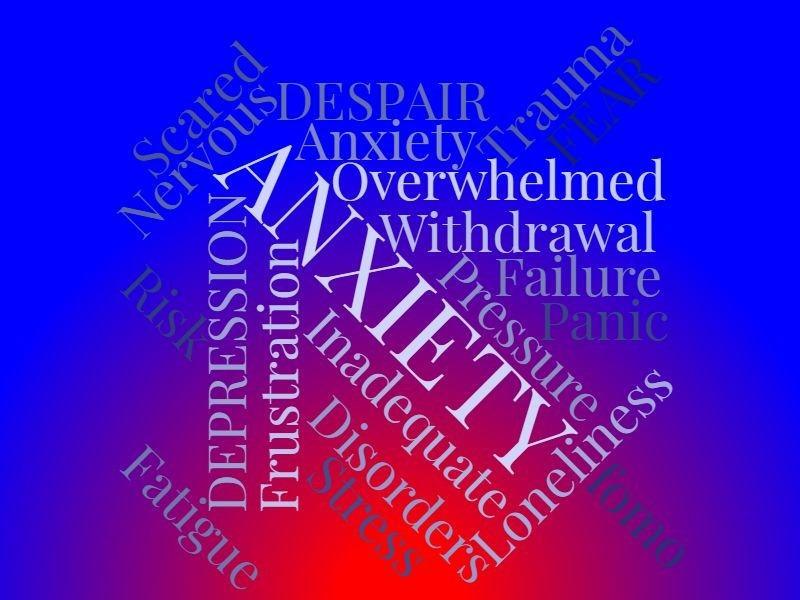
November 1-2, 2019
Earn up to 7.5 CE Credits!
Hanover Manor 16 Eagle Rock Avenue East Hanover, NJ 07936 973-887-2682
For directions and venue ADA access, visit www.thehanovermanor.com
The New Jersey Psychological Association is pleased to invite you to the 2019 Fall Conference. Psychologists, mental health providers, physicians, marriage and family therapists, educators, social workers, and graduate students will gather to learn about the latest therapeutic strategies and effective interventions for anxiety from a stellar group of professionals and experts in the field Anxiety is now recognized as the most prevalent emotional condition in the US and the world, according to the National Institute of Mental Health and the World Health Organization The soaring trend toward anxiety has been accelerated by global stress and highprofile threats, such as terrorism, gun violence, cyberbullying, and other realities of the modern world. This is compounded by increasing stresses to children, that can include divorce, family breakdown, and academic competition producing a “shell shocked” generation of youth suffering from high levels of anxiety
Friday Night Events, Banquet, and CODI CE Program (1.5 CE Credits)
Registration Fee: NJPA Member: $75 | NJPA Sustaining Member: $63.75 | NJPA ECP: $52.50 | NJPA Student Member: $37 50 | Non-Member: $150
Saturday All Day Conference (6 CE Credits)
Registration Fee: NJPA Member: $240 | NJPA Sustaining Member: $200 | NJPA ECP: $165 | NJPA Student Member: $80 | Non-Member: $480
Refund and Grievance Policy may be found at www.psychologynj.org/ce-program-grievance-procedure.
v e r M a n o r , 1 6 E a g l e R o c k A v e n u e , E a s t
H a n o v e r , N J . F o r d i r e c t i o n s a n d v e n u e A D A a c c e s s , v i s i t w w w . t h e h a n o v e r m a n o r . c o m .
H e r e a r e a f e w h o t e l s i n t h e n e a r b y a r e a :
T h e W i l s h i r e G r a n d H o t e l
T h e W e s t m i n s t e r H o t e l
C o u r t y a r d H a n o v e r W h i p p a n y b y M a r r i o t t
P l e a s e v i s i t w w w . p s y c h o l o g y n j . o r g f o r d e t a i l s
New Jersey Psychology Association (NJPA) is approved by the American Psychological Association to sponsor continuing education for psychologists. NJPA maintains responsibility for the program and its content. Please direct your questions concerning an NJPA or NJPA Co-Sponsored CE program, to NJPA Central Staff You may email your question(s) to njpaad@psychologynj org or call 973243-9800
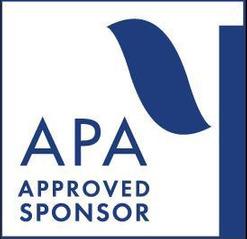
V I S I T O U R S P O N S O R S & E X H I
!
B I T O R S
C
T
o n f e r e n c e V e n u e a n d H o t e l R e s e r v a t i o n s
h e 2 0 1 9 F a l l C o n f e r e n c e w i l l b e h e l d a t T h e H a n o
2019 Fall Conference Schedule
Chair: Dennis Finger, EdD
Past Chair: Marc Gironda, PsyD
Past-Past Chair: Phyllis Lakin, PhD
Chair-Elect: Mark Lowenthal, PsyD Events Committee Chairs:
Leah McGuire, PhD
Sharon Ryan Montgomery, PsyD
Homestudy Committee Chair:
Nathan McClelland, PhD
CE Approval Committee Co-Chairs:
Ray Hanbury, PhD
Mark Lowenthal, PsyD
CODI Representatives:
Susan Esquilin, PhD
Abisola Gallagher, EdD
Board Representatives:
NJPA Treasurer: Dan DaSilva, PhD
Membership Committee Chair: Randy Bressler, PsyD
NJPA Staff: Keira Boertzel-Smith
Ana DeMeo
A special thank you to all of our continuing education application reviewers for your hard work and commitment to helping us keep up with all the many submissions! And also, to the Programming Events and Homestudy Committtee members who plan the program calendar, solicit presenters, and manage program content and development
CE
Friday, November 1, 2019 Registration............................................................................................................................. 4:00 pm - 7:30 pm Open Association Business Meeting Jane Selzer Member Recognition Awards &NJPAGS Chair Certificate of Appreciation..... 4:00 pm - 5:00 pm Cocktail Reception: Appetizers & Cash Bar Academic & Scientific Awards, Dawn Gemeinhardt Student of Excellence Award, and NJPA Foundation Awards............................................................................................... 5:00 pm - 6:00 pm Banquet Award Presentations: Citizen of the Year, Legislator of the Year, Lifetime Achievement Awards, & Stanley Moldawsky Mentor Award................................ 6:00 pm - 7:30 pm Committee on Diversity and Inclusion CE Program (1 5 CE Credits available) 7:30 pm - 9:00 pm Saturday, November 2, 2019 Registration & Continental Breakfast Buffet......................................................................... 7:30 am - 8:45 am Vendors & Exhibits................................................................................................................ 7:30 am - 1:30 pm NJPAGS Poster Session 7:30 am - 1:30 pm Welcome Psychologist of the Year Presentation................................................................................... 8:45 am - 9:15 am General Session with Dr. Paul Foxman (includes 15 minute refreshment break)............................................................................... 9:15 am - 12:30 pm Social Luncheon.................................................................................................................. 12:30 pm - 1:15 pm Afternoon Sessions.................................................................................................................1:15 pm – 4:30 pm (includes 15 minute refreshment break) 2019 Council on Continuing Education
Affairs
Homestudy Library
2019 Fall Issue:
New Jersey’s Response to the
Crisis Visit www psychologynj org and hover over the Learn tab on the main menu From the drop down menu, choose the CE Homestudy Library link This will take you to the BeaconLive library
NJ Psychologist Special Sections Eligible for CE Credits 2018 Fall issue : Special Section (3 CE Credits) Treating Substance Abuse 2019 Winter issue: Special Section (3 CE Credits) Practical Applications of Neuropsychological Testing
Special Section (3 CE Credits)
Opioid
Friday Night: November 1, 2019
Awards Ceremony Schedule
Jane Selzer Member Recognition Awards &NJPAGS Chair Certificate of Appreciation............................................
Academic & Scientific Awards, Dawn Gemeinhardt Student of Excellence Award, and NJPA Foundation Awards
Award Presentations: Citizen of the Year, Legislator of the Year, Lifetime Achievement Awards, & Stanley Moldawsky Mentor Award
*The Psychologist of the Year Award will be presented Saturday, November 2nd during the Welcome and Opening Remarks
Diversity Town Hall: Addressing Racial Trauma in Therapy: Managing Client & Therapist Anxiety
Moderator: Caridad Moreno, PhD and Lucy Sant'Anna Takagi, PsyD with Panelists: Jennifer Jones, PsyD, Briana Cox, PsyD, and Susan Herschman, PsyD
7:30 pm - 9:00 pm
1.5 CE Credits
We are exposed to the issue of racism through media and daily experience and so are our clients. Many times our clients need a safe space to navigate all of the input they receive and come to terms with how racism and oppression are impacting their lives. Dealing with the topic of racism in an open, factual, and compassionate way may alleviate some client anxiety around the topic and help them address these issues in a safe environment This session will explore the role race plays in the therapeutic process when addressing issues of racial trauma and offer the participants techniques to openly discuss race and racial trauma in a therapeutic setting. White fragility is a process by which White people experience discomfort and anxiety when confronted with information about racial inequality and injustice This presentation further explores ways in which this process impedes White therapists’ ability to effectively treat people of color, particularly those affected by race-based trauma There will be an opportunity to explore the concept of White fragility in small group discussions.
A group exercise will be employed, lasting 30 minutes, at the end of the two Committee on Diversity and Inclusion (CODI) presentations on Racial Trauma The audience will be divided into smaller groups, with CODI members role playing and facilitating the exercise. The exercise will consist of 1-2 brief role plays, displaying a Black client in session with a non-Black psychologist, reporting different anxiety-provoking incidents The goal of the role play (s) will be to highlight situations where incidents perceived as racially loaded or traumatic can be effectively addressed by the therapist in a racially sensitive manner. Further, role play (s) discussion should highlight the psychologist’s humility in addressing the patient’s experience, as well as possible complaints about the therapy
Diversity Town Hall: Moderators & Panel
Dr. Caridad R. Moreno provides individual and group counseling to children with cancer and blood disorders and their families at the Valerie Fund Children’s Center, Children’s Hospital at Newark Beth Israel Medical Center in Newark, NJ Dr Moreno provides crisis intervention and psychological consultations and assessments
Dr. Lucy Sant’Anna Takagi, president-elect, NJPA. Dr Takagi provides psychotherapy to adults with a variety of clinical problems, and psychological evaluations for undocumented Portuguese-speaking immigrants seeking documentation
Dr. Jennifer R. Jones-Damis is the associate director of Mental Health Services at the NYC Health & Hospitals (Rikers Island Correctional Health) Dr Jones-Damis is responsible for the clinical oversight, management, and innovative development of the alternative to solitary confinement housing areas at Riker’s Island
Dr Susan Herschman has been a New Jersey school psychologist for 20 years and in private practice in Randolph, NJ since 1997 Dr Herschman has been a consultant to the Division of Child Protection and Permanency (DCP&P) since 2001
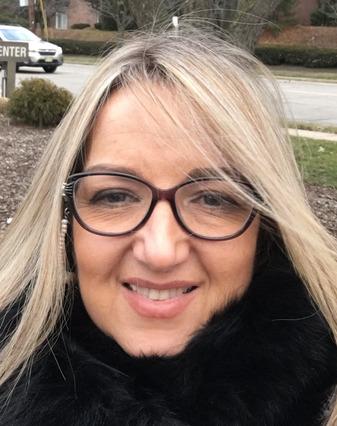



Dr Briana L Cox is a psychologist in private practice in South Orange, NJ providing forensic evaluations for adults, children, and families involved with the Division of Child Protection and Permanency (DCP&P) as well as individual, group, and couples therapy to private clients and those referred through the courts or DCP&P

4:00
pm - 5:00 pm
................................................................................................. 5:00
6:00
pm -
pm
................................................................................................ 6:00 pm
7:30
-
pm
Saturday: November 2, 2019
The Anxiety Epidemic
FEATURED SPEAKER - Paul Foxman, PhD

Morning General Session | 9:15 am - 12:30 pm | 3 CE Credits
The keynote session will explore how, when, and why anxiety arises, as well as an overview of effective therapeutic strategies and interventions. Data on the prevalence of anxiety will be provided, including a historical review of anxiety diagnoses. The presentation will distinguish between “normal anxiety” and anxiety disorders. Dr. Foxman’s “Three Ingredients” framework will address the genetic and learning basis of anxiety, the assets and liabilities of the “anxiety personality style,” and the relationship between stress and anxiety Included will be a brief history of therapy approaches from psychoanalysis to mindfulness
Recognizing and Treating Anxiety Disorders in Children
Paul Foxman, PhD
Afternoon Session – A | 1:15 pm – 4:30 pm | 3 CE Credits
This workshop builds on Dr Foxman’s morning keynote address and focuses on anxiety in children. Practical treatment strategies will be discussed for the following selected anxiety disorders: separation anxiety, panic disorder, generalized anxiety disorder, obsessivecompulsive anxiety disorder, social anxiety disorder, trauma and stressor-related disorders. Emphasis will be on integrative psychotherapeutic interventions involving insight-oriented, cognitive-behavioral, exposure, mind-body, and solution-oriented and family systems approaches A profile of the effective child therapist will be presented, as well as suggestions for including parents in the therapy process
Paul Foxman, PhD is founder and director of the Vermont Center for Anxiety Care, a private practice and therapisttraining program in Burlington, VT. He is the author of several books on anxiety including The Worried Child, Dancing with Fear, and The Clinician’s Guide to Anxiety Disorders in Kids and Teens

Acceptance of Anxiety: A New Cognitive Behavioral Approach to GAD, Panic, OCD, PTSD & Social Anxiety
Lynn Mollick, PhD
Afternoon Session – B | 1:15 pm – 4:30 pm | 3 CE Credits
Early CBT developed cognitive and behavioral interventions to reduce anxiety, but more recently the field has taken a radically different approach: acceptance of the anxiety experience. Dr. Mollick will explain how struggling to avoid anxious thoughts and feelings only intensifies them. Instead of trying to change dysfunctional cognitions and maladaptive behavior, contemporary CBT teaches: defusion, mindfulness, self-compassion, and identifying and pursuing valued goals Dr Mollick will describe how to implement these new acceptance techniques, as well as how to integrate them into a traditional CBT or psychodynamic practice. In addition, Dr Mollick will provide illustrations of specific acceptance techniques for treating panic, OCD, PTSD, and social anxiety
Lynn Mollick, PhD is the co-leader and co-founder of the New Jersey Association of Cognitive Behavior Therapists

She writes and lectures about CBT and has presented seven workshops on acceptance CBT for anxiety to New Jersey mental health professionals For the past 10 years, she has been leading a CBT training and consultation group for mental health professionals every other Friday morning. Her private practice is in Cranford
Cognitive Behavioral Treatment of Anxiety in Adolescents
Allen H. Weg, EdD
Afternoon Session – C | 1:15 pm – 4:30 pm | 3 CE Credits
Anxiety can often present itself very differently in adolescents relative to anxiety-related struggles in adults. Understanding these differences, as well as how anxiety in youngsters may manifest itself as other difficulties (school avoidance, hostility and anger, mood shifts, etc.), is a necessary prerequisite for effective treatment. This presentation will review these differences with the goal of increasing accurate diagnoses for anxiety disorders in adolescents. We will also explore specific protocols designed from a cognitive behavioral framework and how they can be applied to our younger clients suffering with anxiety related difficulties. Boundaries and roles among therapists, parents, school personnel, and the clients themselves will be addressed
Allen H. Weg, EdD is a New Jersey licensed psychologist. He is founder and director of Stress and Anxiety Services of New Jersey, an independent practice of 10 therapists with offices in East Brunswick and Florham Park, specializing in cognitive behavioral and other evidence-based treatment of OCD, PTSD, and other anxiety-related disorders in children, adolescents, and adults. His practice also offers telehealth services, and has a YouTube channel where Dr. Weg hosts a series of video clips called, OCD Tips
Upcoming NJPA CE Programs
APA and NJPA: An Interactive Discussion
September 20, 2019 | 1.5 CE Credits
An Emerging Framework for Healthcare: Opportunities for Psychology: (1.5 CE Credits)
Changes are taking place rapidly across the healthcare landscape Out of these changes, a framework focused on population health is emerging that will have a profound impact on healthcare and psychological practice Importantly, this framework provides many opportunities for practicing psychologists. This presentation will highlight how psychologists are uniquely qualified to capitalize on these changes Moreover, this presentation will illustrate how a population health framework better enables psychologists and other behavioral health professionals to reach underserved populations and help diverse groups with unaddressed behavioral health needs.
Town Hall with Dr Arthur C Evans, Jr: The Future of Psychology and APA

A Moderated Panel Discussion: Psychology at the CrossRoads in New Jersey: The Many Faces of New Jersey Psychologists. An interactive Discussion with a Panel of Thought Leaders about Scope of Practice, Integrated Care, Access to Care, Work Settings, and Social Advocacy: (No CE available)
New Member Benefit! CE Transcript Portal: Log, Review, and Download
Members can now use our new CE Transcript Portal, an organizational tool to help you manage your CE activities We'll be emailing details soon!
Autism Spectrum Disorder
September 27, 2019 | 2 CE Credits
A Grand Rounds Workshop:
This program will be covering an overview of Autism Spectrum Disorder including DSM-V diagnostic criteria; screening and assessment tools; prevalence and suspected risk factors; common medical and mental health co-morbidities; treatment and ways to modify techniques and approaches; and resources for patients, families and clinicians.

Learning Objectives:
1 Identify the basic features of ASD
2 Describe racial and ethnic disparities impacting ASD diagnosis and treatment
3 Identify common medical co-morbidities
4 Identify common mental health co-morbidities
5. Describe ways to modify therapy techniques for a patient with ASD
6 List ways to modify the physical environment and communication for patients with ASD
Upcoming NJPA CE Programs
Workshop
Part 1: Summaries of the 7 most important CBT Therapies in 2019
Prolonged Exposure, Cognitive Therapy, Acceptance and Commitment Therapy, Dialectical Behavior Therapy, Cognitive Processing Therapy, Mindfulness-Based Cognitive Therapy, Positive Psychotherapy
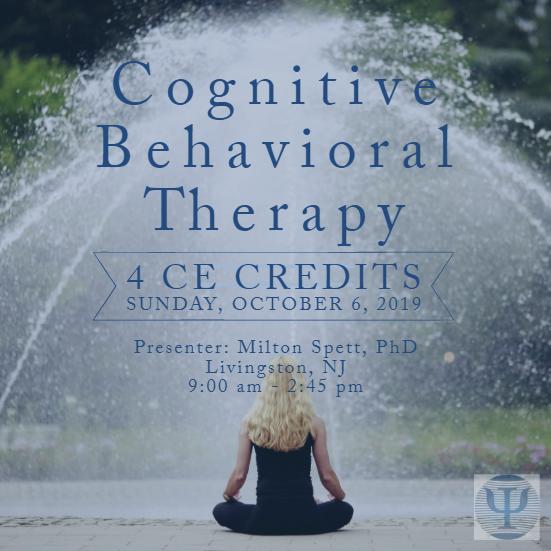
Part 2: New forms of CBT Inhibitory Learning Theory, The Cognitive Behavioral Analysis System of Psychotherapy, Concreteness Training, Memory Specificity Training for PTSD
Part 3: New research has found certain CBT techniques are very effective and other CBT techniques are not effective New techniques for increasing the effectiveness of exposure for anxiety disorders
• When to use which form of Mindfulness
• When relaxation should and should not be used for anxiety disorders
Part 4: Contemporary CBT for specific disorders Depression, panic disorders, social anxiety, PTSD, OCD, phobias, eating disorders, couple therapy, chronic pain, insomnia, and generalized anxiety disorder
Part 5: Unified Protocol for Transdiagnostic Treatment of Emotional Disorders
Presenter: Dr Spettistheco-founderandco-leaderoftheNewJerseyAssociationofCognitiveBehavioralTherapists Thiswillbehis 15thpresentationonCBTfortheNewJerseyPsychologicalAssociation
As practicing health care providers, psychologists face a variety of legal and regulatory challenges. Complying with HIPAA and state confidentiality laws is one of the most complex and pervasive of these challenges. This workshop will provide attendees with a basic overview of HIPAA and HIPAA compliance, relevant New Jersey patient confidentiality laws, and the interaction between these federal and state legal frameworks
Topics discussed will include:
● What are some common HIPAA “myths” and misconceptions?
● Who must comply with HIPAA?
● What information does HIPAA require a psychologist to give a patient at the outset of the relationship?

● When does HIPAA require written authorization to disclose patient information? When does it not?
● What are some NJ-specific exceptions to patient confidentiality?
● What does HIPAA require if a psychologist is storing patient information electronically?
● What must be done in the event of a “breach”? For example, if a laptop or smart phone containing patient files is lost or stolen
Presenter: Brad Steinbrecher is Director, Legal & Regulatory Affairs with the American Psychological Association's Practice Directorate.
HIPAA
CE Credits CBT
CE Credits
October 20, 2019 | 3
October 6, 2019 | 4
